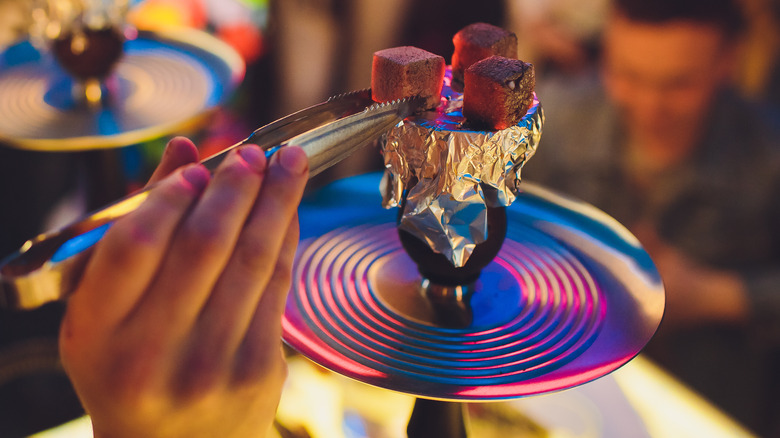Is Smoking Hookah Bad For You?
According to Fumari, the first-ever hookah lounge established in San Diego, the tradition of smoking hookah ranges all the way back to the 16th century. Originating within Middle Eastern cultures, smoking hookah was a means of hosting both guests and loved ones alike and served as a status symbol for the upper class. From India to Turkey, the practice has become widespread in various parts of the world, including the United States. Deviating little from the original practice, smoking hookah is an activity designed to foster connection among people from all backgrounds and walks of life.
The term "hookah" refers to the apparatus itself. It also goes by the names shisha, goza, and narghile, among others (via the Mayo Clinic). Its various parts consist of a smoke chamber, pipe, bowl, and a rubber hose used for inhalation. The combination of tobacco and heat produces smoke, which is then filtered through the water in the base of the hookah and drawn upwards into the mouth through the hose. According to the American Lung Association, hookah tobacco can come in a wide range of sweet flavors including watermelon, caramel, chocolate, and tutti frutti.
The U.S. Centers for Disease Control and Prevention (CDC) cautions against the harmful effects of smoking cigarettes. Do these same concerns apply to smoking hookah as well?
Smoking hookah poses similar health risks as smoking cigarettes
Unfortunately, smoking hookah poses many of the same risks as cigarette smoking — if not more. According to the American Lung Association, smoke inhaled from a hookah contains over 80 harmful substances such as tar, carbon monoxide, and other cancer-related chemicals. Because nicotine is also present in the smoke, addiction can develop in the same way cigarette dependency can. Additionally, smokers may be at risk for infection if hookah equipment is improperly cleaned.
Smoking hookah is popular across all ages. Statistics reveal that in 2017, over 2 million adults smoked hookah (per American Lung Association). Smoking flavored tobacco can have both long-term and short-term side effects. Upon smoking, users experience an immediate decrease of blood flow to the lungs, an increase in blood pressure, and an accelerated heartbeat. Long-term use can lead to lung and heart disease, oral cancers, and birth complications. Although the social aspects of smoking hookah may sound appealing, when it comes to our health, it's best to avoid smoking altogether — in whatever form it comes in.
If you or anyone you know is struggling with addiction issues, help is available. Visit the Substance Abuse and Mental Health Services Administration website or contact SAMHSA's National Helpline at 1-800-662-HELP (4357).


